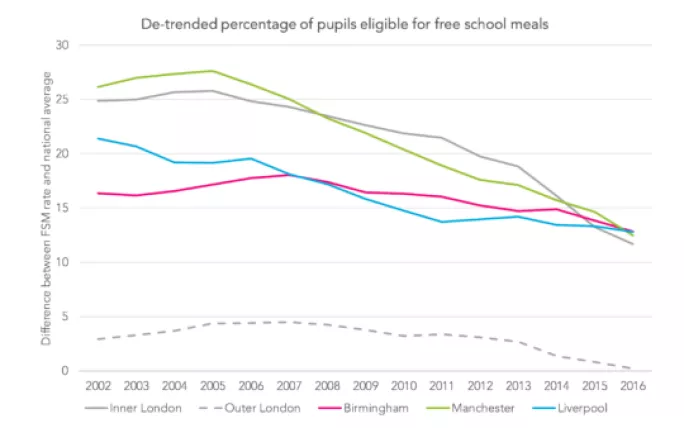Impoverished pupils are increasingly found in rural areas rather than in cities, reflecting a changing pattern of deprivation in terms of those eligible for free school meals (FSM), according to new research.
There have been “sizeable falls” in pupils’ eligibility for FSM in Birmingham, Liverpool, London and Manchester, the Education Datalab research shows.
Meanwhile, some rural areas have seen a rise in FSM eligibility in recent years.
Researchers examined data from the National Pupil Database covering Year 1 to Year 11 state-school pupils, over a 15 year period between 2002 and 2016.
Outlining the findings in a blog, Education Datalab’s chief statistician Dave Thomson said: “What is stark is the extent to which FSM eligibility has fallen in major cities in England”.
Source: Education Datalab
There have been differences within large cities. In Birmingham, the number of school-age children living in the city centre has increased, while the FSM eligibility rate has fallen.
However, there has been “relatively little change in many outlying areas” and in some of these places, “the FSM eligibility rate has in fact increased,” Thomson stated.
The blog points out that major urban centres have become less disadvantaged since 2002, as have smaller towns and cities such as Bedford, Grimsby, Stoke-on-Trent and Telford.
But some rural parts of England have become more deprived over time. Thomson cited Lincolnshire as an example, and said the change shows “how much the demographics of an area can change in a little less than a decade and a half”.
Picture of need
There are various reasons for these changing patterns of deprivation, including levels of investment, migration and the jobs market in different areas, according to the research.
Thomson said: “Little wonder the policy focus has shifted away from major cities.”
The changing pattern of deprivation has informed the new national funding formula, which aims to help historically “underfunded” areas, many of which are in more rural locations. The DfE stated in its proposals last year that “underlying levels of deprivation” that had seen extra funding go to some city schools “have fallen over recent years”.
However, official statistics do not necessarily show the true picture of need. Earlier this year, Tes revealed warnings from headteachers claiming that DfE figures showing the proportion of pupils on FSM at a record low of 14 per cent nationally do not represent the deprivation experienced by many.
Thomson said the findings had implications for programmes such as Teach First. He said: “Teach First has expanded its reach beyond London and into rural and coastal areas. Whether resources have shifted accordingly is perhaps a matter for debate.”
In response, Teach First’s executive director Sam Freedman said: “The geography of disadvantage and social mobility is constantly shifting and it’s important we keep up with these trends.
“Over the last several years our focus has increasingly been moving out of London and into economically-deprived isolated and coastal areas across England and Wales, with two-thirds of our most recent cohort placed outside the capital.”
Want to keep up with the latest education news and opinion? Follow Tes on Twitter and Instagram, and like Tes on Facebook





